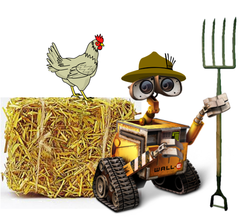|
In a bizarre twist, the word robot derives from Czech, something rare in English. The word picked up popularity after the 1920 sci-fi play Rossum's Universal Robots. In it, flesh-and-blood people were depicted as servants, which explains both how robot today is a "servant" and how the word has origins relating to people. Anyway, the robot part came from the Czech word robotnik, or "forced worker" with "farmer" connotations (sort of like a serf), from robota, "slavery". This derives from the Proto-Slavic cognate orbota, which is in turn from the earlier Proto-Slavic word orbh, "slave". Etymologists reconstruct the word as coming from the Proto-Indo-European term herbh, or "to change status"; something one must do when sold into slavery. Anyway, back to the play. Rossum's Universal Robots eventually made its way to the US, where the latter term came to be applied to machines serving you, an easy connection to make. If anyone refers to a "slave robot" or your "robot" updates its "status", appreciate the etymological irony. It's also justified to giggle at farmers losing their jobs to robots now!
0 Comments
Your comment will be posted after it is approved.
Leave a Reply. |
AUTHORHello! I'm Adam Aleksic. I have a linguistics degree from Harvard University, where I co-founded the Harvard Undergraduate Linguistics Society and wrote my thesis on Serbo-Croatian language policy. In addition to etymology, I also really enjoy traveling, trivia, philosophy, board games, conlanging, and art history.
Archives
December 2023
TAGS |



